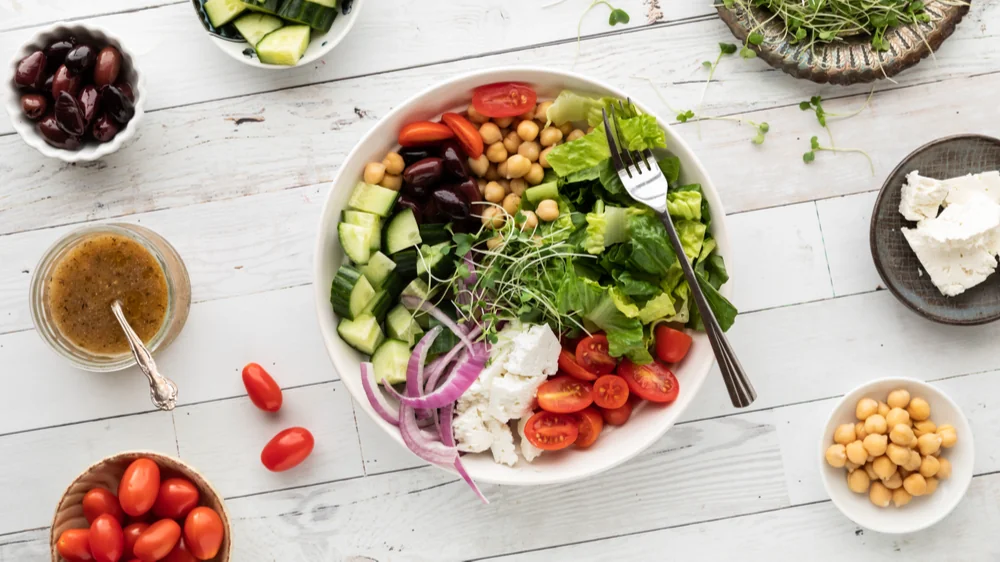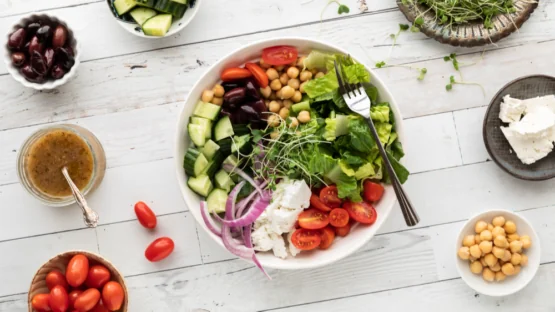Pitching two variants of the Mediterranean diet against each other in a randomized controlled trial, scientists have found that the plant-oriented one, which contained more polyphenols, was more effective for weight loss [1].
Beyond the Med diet
A healthy diet is one of the most powerful anti-aging interventions available today, but the question of which diet is the healthiest is very much open, due to the sheer number of factors involved. The Mediterranean diet, rich in olive oil, vegetables, legumes, fish, and nuts, is probably the most evidence-based of all. Numerous epidemiological studies, and a handful of interventional studies, have linked the Mediterranean diet to various positive health outcomes, including decreased overall mortality along with a lower incidence of cardiovascular diseases and cancer [2].
Now, scientists want to dig deeper and understand which of the many ingredients of the Mediterranean diet make it healthy. In this new paper, the researchers used an interesting study design to elucidate the role of polyphenols, a class of phytochemicals known for their antioxidant and anti-inflammatory properties [3]. Polyphenols are abundant in berries, nuts, vegetables, tea, coffee, and many other plant products.
Double the polyphenols
This group has been studying polyphenols for years, and its previous studies have all linked polyphenols to better cardiometabolic outcomes. For this new randomized controlled trial called DIRECT-PLUS, 294 participants were divided into three groups. The control group ate according to Healthy Dietary Guidelines, while the two study groups were put on a generic Mediterranean diet (MED) and on a more plant-oriented Mediterranean diet (MED-green). Patients in all groups were also put on an identical physical activity regimen.
The two study groups were isocaloric (providing identical numbers of calories), but participants in the MED-green group also consumed 3-4 cups of green tea and one green shake with Wolffia globosa (a strain of duckweed also known as Mankai) a day. These alterations effectively doubled the amount of polyphenols (from 440 mg/day for MED to 800 mg/day for MED-green).
The participants’ mean age was 51 and their mean BMI was 31, indicating obesity. 36% were prediabetic, and another 11% were diabetic. The main endpoint of the trial was weight loss, but it was measured in a more sophisticated way than just putting people on a scale. Instead, MRI technology was used to quantify abdominal adipose tissues. Unfortunately, the trial was lopsided regarding sex, as 88% of the participants were male.
The best diet for the worst type of fat
Following the 18-month trial period, mean weight loss in the control group was negligible, despite patients being physically active. The two study groups, on the other hand, showed substantial weight loss. Although it was bigger in the MED-green group (3.9% vs 2.7% in the MED group), this difference did not reach statistical significance. Results for waist circumference were largely similar.
Importantly, the MED-green diet was proved to be much more effective in reducing the amount of visceral fat, which is considered more harmful than subcutaneous fat [4]. Here, the difference between the two MED diets was evident and statistically significant: the mean visceral fat reduction was 14% in the MED-green group and only 6% in the MED group.
Component analysis
The researchers went to great lengths to establish the effects of particular dietary components. According to their calculations, higher consumption of green tea, walnuts, and dietary fiber, as well as reduced red meat consumption, were all significantly associated with greater visceral fat loss when adjusted for age and sex. However, further adjustments for weight loss and reduction in waist circumference complicated the picture, with only increased dietary fiber consumption remaining statistically significant.
Withing the MED-green group, higher consumption of Mankai was significantly associated with greater visceral fat loss, improved cardiovascular outcomes, and better lipid profiles. Higher walnut consumption and lower red meat consumption seemed to help as well. Most importantly, higher plasma polyphenol levels were significantly associated with visceral fat loss in all models, showing a direct contribution by polyphenols.
Urolithin A is a compound produced by human endogenous bacteria from polyphenols. It is thought to possess health benefits and has been an increasingly popular supplement. Direct urolithin supplementation can overcome limitations of endogenous production such as variability in gut microbiota [5]. In this study, urine urolithin A levels showed a robust association with visceral fat reduction and were themselves associated with increased consumption of walnuts and Mankai.
Conclusion
The Mediterranean diet and polyphenols receive a lot of praise, but proper interventional studies are still rare. The results of this randomized controlled trial confirm the importance of polyphenol consumption and hint at “greener” variants of the Mediterranean diet being more effective for weight loss – especially when it comes to the dreaded visceral fat. Since many aspects of aging are sex-dependent, the disproportionate number of men in this study could have limited the generalizability of the results. On the other hand, visceral fat is thought to be more harmful in men [6].
Literature
[1] Zelicha, H., Kloting, N., Kaplan, A., Yaskolka Meir, A., Rinott, E., Tsaban, G., … & Shai, I. (2022). The effect of high-polyphenol Mediterranean diet on visceral adiposity: the DIRECT PLUS randomized controlled trial. BMC medicine, 20(1), 1-11.
[2] Martinez-Gonzalez, M. A., & Martin-Calvo, N. (2016). Mediterranean diet and life expectancy; beyond olive oil, fruits and vegetables. Current opinion in clinical nutrition and metabolic care, 19(6), 401.
[3] Cory, H., Passarelli, S., Szeto, J., Tamez, M., & Mattei, J. (2018). The role of polyphenols in human health and food systems: A mini-review. Frontiers in nutrition, 5, 87.
[4] Stefan, N. (2020). Causes, consequences, and treatment of metabolically unhealthy fat distribution. The lancet Diabetes & endocrinology, 8(7), 616-627.
[5] Singh, A., D’Amico, D., Andreux, P. A., Dunngalvin, G., Kern, T., Blanco-Bose, W., … & Rinsch, C. (2022). Direct supplementation with Urolithin A overcomes limitations of dietary exposure and gut microbiome variability in healthy adults to achieve consistent levels across the population. European journal of clinical nutrition, 76(2), 297-308.
[6] Kouli, G. M., Panagiotakos, D. B., Kyrou, I., Georgousopoulou, E. N., Chrysohoou, C., Tsigos, C., … & Pitsavos, C. (2017). Visceral adiposity index and 10-year cardiovascular disease incidence: the ATTICA study. Nutrition, metabolism and cardiovascular diseases, 27(10), 881-889.





